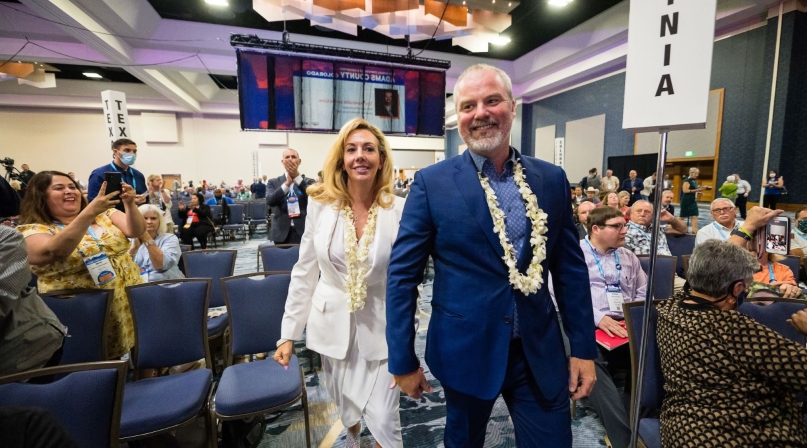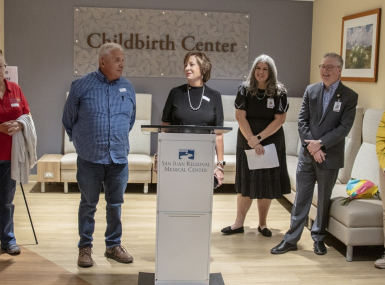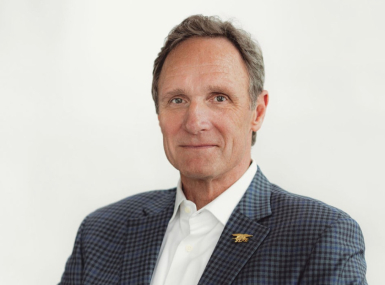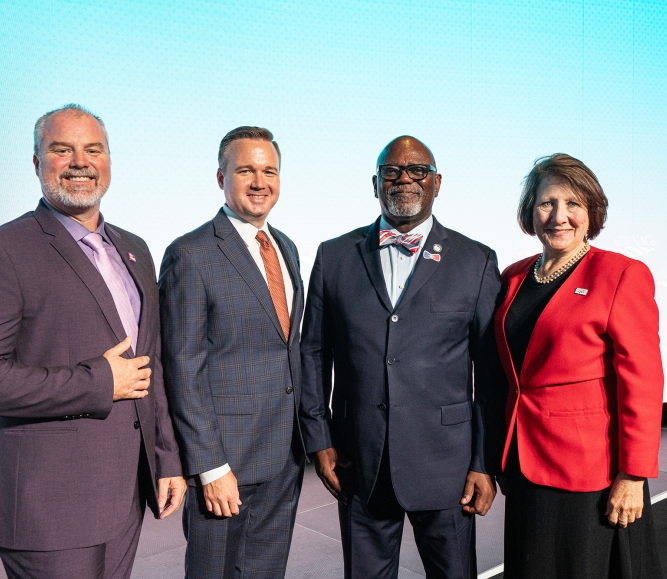NACo President Gore seeks out leadership challenges

Key Takeaways
James Gore searched the world and found what he was looking for back home in Sonoma County, Calif.
That was where, when he was a kid, his mother and grandmother first talked to him about his future.
“My mom and my grandma sat me down and said, ‘We want you to do good things in this world. We believe in you,’” he said. “When I was a teenager, I was always a happenchance leader — I’d raise my hand when they’d call for volunteers and get involved that way. Then when I was in my late 20s and early 30s, I decided I was going to make public service my mission, and it wasn’t going to be happenchance anymore.”
Learn more
Hear a full interview with James Gore on the County News Podcast
In the meantime, he studied agricultural business, worked as a lobbyist for the wine industry, then turned his sights toward service. First as a Peace Corps volunteer in Bolivia, then in a series of roles in the U.S. Department of Agriculture Natural Resources Conservation Service during the Obama administration, working in impoverished areas throughout the United States.
But with a 1-year-old daughter, Gore and his wife Elizabeth moved back to his childhood hometown in 2013. And soon after, a seat on the Sonoma County Board of Supervisors opened, and he won, albeit sooner than he anticipated pursuing public office. One of his early supporters said his misgivings were unfounded.
“Once I met Jimmy, I knew he had the right energy,” said Valerie Brown, a former Sonoma County supervisor who served as NACo president from 2009-2010. “He is a big thinker. You watch certain people, and you can see how well a role will suit them. With his background, supervisor seemed like the right place for him to put his background and experience to work for a place he cares deeply about.”
Rather than seeing government purely as the tool for solving problems, Gore views leadership as an opportunity to galvanize people to work on behalf of the greater good.
“Instead of people talking about what’s wrong or hoping somebody does it or hoping there’s a government program, we need a bunch of people just to stand up and take action,” he said.
And the people elected to county office need to be assertive to get what they want and not be bashful about what counties do, which is “getting stuff done,” Gore said.
“We need to remind each other that we’re doing the work on the ground and that we don’t have to choose in the county world to fight or focus on every wedge issue that divides us in this country,” he said. “We are the ones who get it done on the ground each and every day.
“As the president of NACo, my biggest goal is to make sure that we are owning our place, by not asking for it and demanding it, but by sitting at those tables and forcing our way into the room so that we are the ones driving those solutions,” he said.
Taking action
In 2017, he took on the chairmanship of the NACo Resilient Counties Advisory Committee, initially planning to focus on sustainability, water management and energy development, all issues that would help fortify his county’s future. Instead, he saw the more existential definition of resiliency when the Sonoma Complex Fires burned 87,000 acres of Sonoma County, including much of Gore’s district.
The traumatic process saw Gore rise to the moment in a way that reflected his mother and grandmother’s confidence in him when he was a child.
“I’ve never done such meaningful, purpose-driven work. I knew exactly what I needed to do,” he said. “It wasn’t about getting up and giving speeches. It was about delivering for people who were in a horrible situation.”
The task spoke to the many different facets that government leadership represented. The Board of Supervisors changed permitting regulations and amended the county code. They negotiated with insurance companies. They held forums for residents to air their concerns. Organizing both for the benefit of people who had lost their homes but also those who were at risk of subsequent fires. And they set a new attitude about vulnerability to natural disasters.
That meant organizing preparedness exercises and shifting the county into a proactive posture. It meant taking the county’s emergency operations center out of a bunker and into a visible position at the meeting point of different county functions, and it was changing the public’s perspective.
“I was educating people on the risks, asking them to take ownership, that they are the key to being ready and being prepared,” Gore said. “Once they’re prepared, they don’t have to be fearful. We don’t have to scare them all the time.”
“I saw so much need in other communities and I really didn’t want other communities to wait until it was ‘their turn.’ I wanted to be a part of saying, ‘Wake up, wake up others and stay awake. Don’t live in complacency.’ So, for me, that was a magical time, and it was very, it was difficult. It was painful. The burden of it, the grief that was in the community, the mental health issues, the fear, the rebuild, the costs, the money, all these other things were swarming. But for me, it was a time to deliver locally.”
The work at home
When subsequent fires and floods hit Sonoma County, that planning and training paid off, though the 2017 fires remained a seminal moment in the county’s collective psyche.
“The fires have been the hardest event for people to cope with, harder even than the pandemic,” Gore wrote in NACo’s “Governing on the Ground” book in 2022.
He also noted that the work he did in 2017 took its toll on him, and he was vocal about the need for county officials to address their own mental health challenges in light of the stress their work adds to their lives.
“I was so focused on emergency management that I was becoming very brittle and edgy,” he wrote. “I leaned in and went back to counseling and started to work through my discomfort. Not because I was in the midst of a crisis, but from the perspective that I’m healthy but wearing thin, and I need to address it. So, I made the time for self-care, meditation, prayer and took care of myself and my wife and children. I see a lesson in this for my community. It doesn’t just need a rallying cry. It also needs a deep breath.”
Despite those challenges, Gore thrives on the challenge of county leadership, and strives to demonstrate the example to his daughter Opal and son Jacob the same drive his mother and grandmother instilled in him.
“I want my kids to know that the best things in the world are the things that also are the hardest,” he said. “The easy way out is not a way to live life. If you see something that’s not working, you’ve got to get involved. And once you get involved, you can’t be one-dimensional. You have to be willing to challenge your beliefs.
“I want them to know that they have their hands on the future.”
Related News

Now I know I can adapt my communication style
San Juan County, N.M. Commissioner Terri Fortner spent her career working with people one-on-one, but she overcame hangups about online communication when the pandemic forced her onto video calls when she first took office.

County service meets a veteran’s need for purpose in Spotsylvania County, Virginia
After Drew Mullins transitioned from a high-performance lifestyle in the military, he found the environment and purpose he sought when he took office in his county.
Now I know that solid waste is complicated
Custer County, Idaho Commissioner Will Naillon says solid waste removal is "one of the things that people often take for granted until it’s their job to make sure it happens... that’s the story of being a county commissioner."
County News
Sonoma County’s James Gore takes the lead at NACo
Surrounded by his family, Sonoma County, Calif. Supervisor James Gore was sworn in July 15 as NACo’s new president at the association’s Annual Business Meeting at the Tampa Convention Center in Hillsborough County, Fla.

